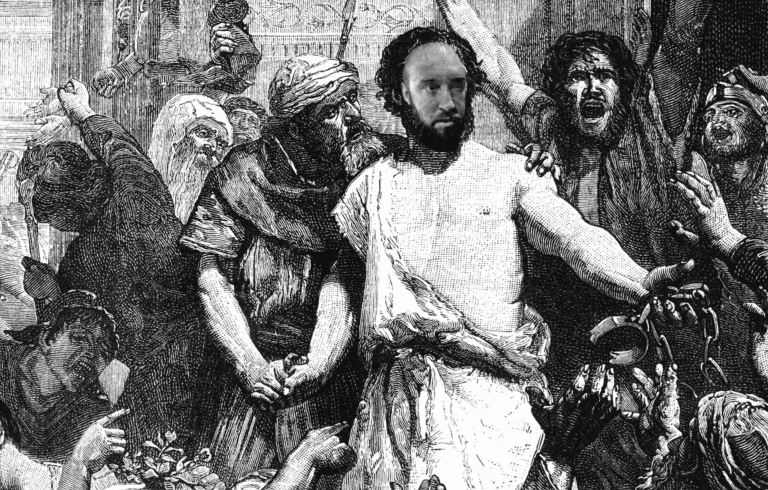
In all 4 Gospels accounting for Jesus life, we find an event in the trial of Jesus where Pontius Pilate brings a prisoner out before the crowd. According to Scripture, it was customary for the Governor to grant clemency on a prisoner’s death sentence as a sign of goodwill toward the Jewish citizens, at Passover. The Jews that were calling for the crucifixion of Christ were given the choice between Barabbas and Jesus.
We’ll get back to that account but let’s talk a look at this interesting Biblical figure? There is nothing that happens under God that doesn’t have a reason. Even his name holds symbolic significance.
The name “Barabbas” is Aramaic, and it can be translated in a couple of different ways, depending on the interpretation:
Son of the Father: The name “Barabbas” can be understood as “bar-Abba,” where “bar” means “son” and “Abba” means “father” in Aramaic. So, “Barabbas” could be interpreted as “son of the father.” This interpretation suggests a symbolic contrast between Barabbas, the earthly criminal, and Jesus, the divine Son of God.
Son of the Rabbi: Some scholars suggest that “Barabbas” could also be translated as “son of the rabbi” or “son of the teacher.” In this interpretation, “Barabbas” would be understood as a patronymic, indicating that Barabbas was the son of a man named Abba or Rabbi. However, this interpretation is less commonly accepted than the “son of the father” interpretation.
In Christian tradition and biblical scholarship, the more prevalent interpretation is that “Barabbas” means “son of the father,” highlighting the contrast between Barabbas and Jesus in the narrative of Jesus’ trial and crucifixion. What cannot be ignored, however, is that there was real tension between the religious leadership of Israel and the occupying Romans. Could political bitterness have contributed to the crimes of Barabbas?
Scripture tells us Barabbas was a notorious criminal imprisoned for murder. His crimes were linked to insurrection in the city.
The reason that this is important is that it makes the man more than an everyday criminal, as sometimes portrayed. He was part of the resistance. For decades, there had been growing tension between the Jewish people and the Romans that ruled over them. There were no doubt times where violence flared up in the streets.
The full details of Barabbas’ crimes are not available, but it’s highly probable that he was involved in a skirmish or riot that led to the death of a Roman soldier. The punishment for political crimes was death by crucifixion. Crucifixion was arguable the most feared form of execution and both Barabbas or Jesus faced with the crowd
The accounts of Jesus and Barabbas in the Bible can be found in Matthew 27, John 18, Mark 15, and Luke 23. Peter also mentions the event in Acts 3.
In the Gospels, we find the Roman governor, Pontius Pilate, set to release a prisoner chosen by the crowd during the Jewish festival of Passover. In the infamous story, Pilate offers the crowd a choice between releasing Jesus, whom he perceives as innocent, or releasing Barabbas, the notorious prisoner who had participated in a revolt against the Roman authorities.
Jesus is the Prince of Peace. Barrabas represents the violent revolutionary element of the Jewish population who sought to overthrow Roman rule by force. In fact, Barabbas somewhat represented more of the qualities Israel was seeking for the Messiah. The first-century Jews wanted a military leader, like a King David, who would lead them to victory over their captors.
The mob overwhelming chose Barabbas, the rebel, over Jesus, the True Messiah. They screamed “Give us Barabbas!” and “Crucify Him” (Jesus). Pilate was hesitant, even being warned by his wife about a troubling dream, but elected to go with the will of the mob.
Sadly, like many other instances, Israel chose a path that was against God for their own desires and purposes. Jesus came to give them citizenship in the Kingdom of God. Choosing Jesus would not equate to political dominance and conquest on the battlefield. That’s why they rejected it. It didn’t line up with their paradigm of God’s plan.
In that critical moment when they chose Barabbas!”, they were rejecting God’s plan to move them out from the old covenant and into the new.
The crowd that day had a choice in front of them with Barabbas and Jesus. Choose a criminal and son of the law and a temporary fading covenant or go with the Son of God, who would lead them into an everlasting promise. Who was Barabbas? We know who he wasn’t. He wasn’t the Messiah.Pilate granted the death sentence upon Jesus. He was scourged and crucified.
Read more: What did Jesus say on the Cross?
Who was Barabbas? Want to learn more about the account of Barabbas and Jesus? Check out this short video.
The validity of the event has been contested by skeptics and even some theologians. The arguments vary and range from the account being metaphorical to it being completely fabricated. At the center of most of these denials is the actions of Pilate himself in light of Roman protocol. Would Pilate even release a prisoner?
Skeptic Bart Ehrman argues that the concept of a Roman Prefect, like Pilate, freeing a Jewish rebel would be so far fetched it can’t be true. In a blog titled “Pilate Released Barabbas. Really?” Ehrman writes:
Are we supposed to believe that the ruthless, iron-fisted Pilate would release a dangerous enemy of the state because the Jewish crowd would have liked him to do so?… Of course not.
Bart Ehrman
Who was Barabbas to Bart Ehrman? He was a made up character by the early church to point out the “wickedness” of choosing a murderer over the Messiah and nothing more. Not so fast.
The skeptic does have a point in that it would be highly out of the ordinary for a Powerful Roman Governor to appease a crowd by releasing someone who could be a threat to Rome. Ehrman conveniently ignores historical record. The claims that Pilate would never act this way fall short when you consider what the Historian Josephus wrote about how Pilate ruled over Judea. You’ll find in this next section that the event depicting Barabbas and Jesus before the Roman Governor is not a farfetched concept.

In a brief detour of our study of the Gospel accounts of Barabbas and Jesus, let’s look at two separate writings from the Historian Flavius Josephus. Neither directly prove who was Barabbas or whether the incident happened. However, these passages in the famous works The Jewish War and The Antiquities of the Jews prove that Pontius Pilate made some very interesting concessions in favor of the Jewish people that were uncharacteristic of the “iron-fisted Roman rule”
In approximately 27 AD, Pilate brought his troops to Jerusalem for the winter and also brought images of Caesar into the Holy City. This was a direct violation of Jewish law that strictly prohibited such glorifying of anything other than Yahweh. The Jews protested and watch what happened.
Pilate also said to them that they should be cut in pieces, unless they would admit of Caesar’s images, and gave intimation to the soldiers to draw their naked swords. Hereupon the Jews, as it were at one signal, fell down in vast numbers together, and exposed their necks bare, and cried out that they were sooner ready to be slain, than that their law should be transgressed.
Hereupon Pilate was greatly surprised at their prodigious superstition, and gave order that the ensigns should be presently carried out of Jerusalem.
Josephus, Jewish War 2.9.2-4
And when the Jews petitioned him again, he gave a signal to the soldiers to encompass them round; and threatened that their punishment should be no less than immediate death, unless they would leave off disturbing him, and go their ways home.
But they threw themselves upon the ground, and laid their necks bare, and said they would take their death very willingly, rather than the wisdom of their laws should be transgressed. Upon which Pilate was deeply affected with their firm resolution to keep their laws inviolable: and presently commanded the images to be carried back from Jerusalem to Cesarea.
Antiquities of the Jews 13.8.1
Pilate responds in typical Roman fashion with threats, violence, and intimidation. The Jewish people were so passionate about keeping God’s law that Pilate actually conceded and removes the images of Caesar. That is unthinkable according to Roman Protocol. The Emperor was worshipped as a god! Rejection of him meant certain death.
The point is, if Pontius Pilate backed down a few years earlier to this type of protest, it is absolutely plausible that he could have created a special tradition to release a prisoner as a gesture of good will. After all, volatility in the region would have gotten Caesar’s attention. Pilate did not want a rebellion.
What if the Emperor felt he wasn’t up to the task? Caesar would have removed him or worse! What if it would have drawn attention to the fact that the Governor caved in when the populous rejected Caesar’s image? It might have cost him his head?
Yes, Pilate could be vicious and iron-fisted, but there is historical proof that he broke protocol in the face of resistance passionate and rebellious Jewish population.
This is where the “that could have never happened” argument falls flat.
The story of Barabbas and Jesus is far more significant than just a bump in the road on the way to crucifixion. What does Barabbas represent? Barabbas and Jesus both represented two very different paths for Israel.
If we are not careful, we can even fall into a similar trap today. The Apostle Paul talked about choosing between the temporal and the eternal.
We often choose the temporary, physical, victories. But, they lead to disappointment and loss. Nothing here lasts forever. To everything, there is a season.
God wants us to live from a place of eternal victory, where physical things come and go but the Kingdom we possess and all the rewards that come from that are forever. Our Savior is not the things of this world. He certainly doesn’t sit in Washington D.C. Jesus sits on the throne in Heaven.
Who was Barabbas? The bigger question is Who was Jesus?
Ask yourself, are you open to God doing a new thing in your life or still pursuing old, temporary fixes. Jesus is the answer. Trust in Jesus, who makes all things new! (Rev 21:5)
There is an Easter Egg (Hidden surprise) in this article. Did you find it? Scroll up to the top of the page and look If so we would love to hear from you. Contact us
© Sound of Heaven Church 2011- 2024